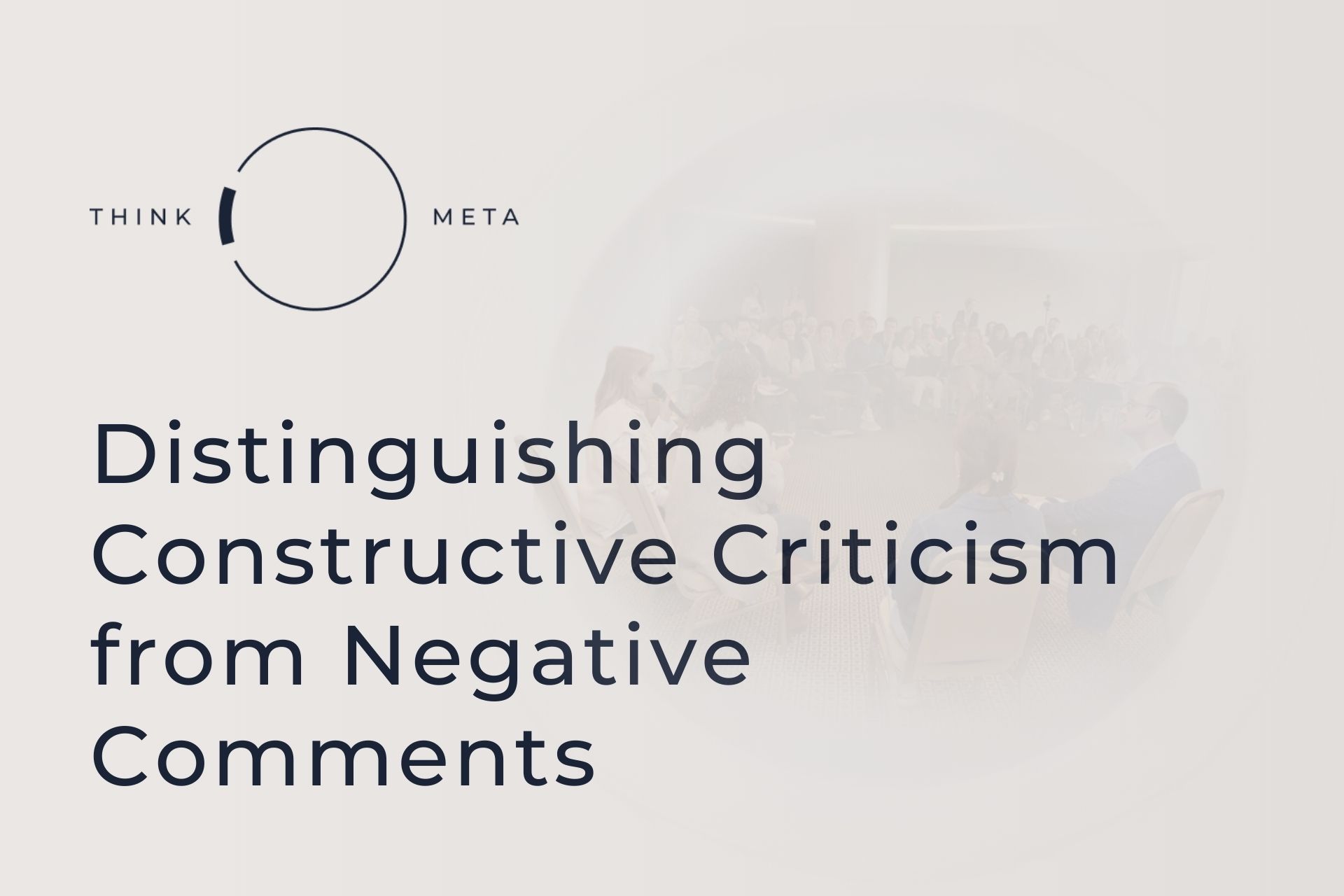Distinguishing Constructive Criticism from Negative Comments

Though they might claim otherwise, most people are not good at giving and receiving constructive feedback. Some people even avoid situations where they might be evaluated. If you are one of them - now is the time to stop. Feedback is a key ingredient for personal and professional growth.
It is well known that feedback or just reinforcement can greatly improve learning. This is not surprising. To progress, we need to know what we are doing well and which aspects need improvement. Imagine learning dance or a foreign language without any feedback. Many of us would not progress and most likely would even stop trying.
Receiving positive feedback is certainly a pleasant experience. However, observations that pinpoint flaws and areas needing improvement are far more informative. It can be a humbling experience to face our imperfections and mistakes, but it is also a proven way to improve.
However, though constructive feedback most likely will not be only praise, it is rarely malicious. It is essential to differentiate constructive criticism from negative comments. This is important whether we are talking about feedback from others or our inner voice. Constructive feedback promotes well-being and growth, while negative comments aim to put you down.
Defining Constructive Criticism and Negative Comments
The main characteristic of constructive criticism is that "the feeling of failure, often linked with unpleasant emotions, low self-efficacy, and anxiety, is coupled with a sense of hope and a recognition of the potential towards greater learning and goal progress" (Fong et al., 2018, pp.42-43).
The same authors proposed a model of constructive criticism. They emphasized that to qualify as constructive criticism, some conditions need to be met:
- Feedback giver cares and respects the receiver
- Feedback is well-intentioned, shows a pathway to improvement, and is appropriate to the receiver
On the other hand, destructive criticism can be defined as "general, inconsiderate, and threatening" (Fong et al., 2018, p. 44). Studies showed that people who received destructive criticism experienced higher levels of anger and tension and lower self-efficacy compared to those who got constructive feedback.
Navigating Feedback for Personal Growth
Even when we are fully aware of the potential benefits of feedback, sometimes we will not be able to fully accept it and learn from it. However, processing and learning from constructive criticism is another skill that can be learned.
One study (Fong et al., 2016) showed that our attitude toward feedback can greatly influence how we receive it. In situations where they received constructive or negative feedback, the group that was classified as feedback-seekers showed more positive emotions compared to the group of feedback-avoiders. Interestingly there were no differences between feedback-seekers and feedback-avoiders when they received positive feedback.
The study mentioned above is important because it suggests we need to take an active role in our growth by seeking feedback on how to improve. This is hard and puts us in a vulnerable position by becoming aware of and revealing our weaknesses to others. Although we all enjoy positive feedback or appraisal, this type of feedback has less informative value for further progress.
Learning how to manage emotions when facing constructive criticism or even negative comments is an important skill. It helps to be aware of the intent and to see it as an opportunity, not as proof of incompetence. It's also important to be aware that making mistakes is not only inevitable but also an effective way to learn. Finally, remember to be kind to yourself.
Strategies for Receiving and Assessing Feedback
Even if we actively avoid feedback, we will face it one way or another. Though you might feel that receiving and giving feedback is a skill you've not yet mastered, it doesn't mean that you can't start practicing today. You probably already have some knowledge that can help you in this process.
Active listening and open-mindedness are very important for receiving and using feedback for personal development. When we listen actively, we are more focused on meaning and intentions than on negative words. Open-mindedness allows us to accept that we might not always be right and to explore other options that we might not have considered before.
Finally, it is important to stay objective while evaluating feedback. Negative comments can destroy your self-confidence. However, unrealistic positive feedback will boost the ego and might rob us of opportunities for growth. Be careful who you listen to. Always consider the source and how their feedback can benefit you. If it can't - forget it.
For example, if you're a basketball player and aim for a professional career, comments and concerns about your height will not help you play better. They might make you feel hopeless because you cannot control your physical growth. And even discourage you from achieving your goal. On the other hand, feedback about the technical aspects of the game will likely be beneficial for your improvement.
Cultivating a Positive Mindset towards Feedback
If you are still anxious when you think about evaluations, remind yourself that they are tools that help you grow. Also, remember the person giving you feedback may also feel anxious about your reaction but is still doing it - because your well-being is more important than discomfort. Finally, that person is not just giving you feedback but also their time.
Try to embrace a growth mindset. It is not easy, for sure. One study (Forsythe & Johnson, 2017).) showed that students who perceived their intelligence as a fixed factor that cannot be changed were less open to feedback. Instead, they showed more defensive behaviors that served as protection for their self-esteem. People with a fixed mindset are less likely to challenge themselves and are too concerned with results. Even more concerning is that this study showed the majority of students were classified in the fixed mindset category.
How can we move toward a growth mindset? Small steps can provide great results. By encouraging self-reflection and continuous improvement, you will not only be able to handle feedback better but will also actively search for it.
Responding to Constructive Criticism and Negative Comments
No matter how open-minded and willing to accept criticism we are, we might still be taken aback by some unexpected comments. When we care about something, we often don't want to hear the truth, even when it's in our best interest. Nevertheless, there are some practical tips on how to handle criticism and use it for our benefit.
Tips for handling constructive criticism gracefully
- Listen carefully - it's easy to be triggered when we feel threatened or when we hear something we don't like. However, don't let details distract you from the broader picture. Constructive criticism not only identifies what you are doing wrong - it gives you direction for improvements. It's up to you whether you see feedback as the revelation of your flaws or the discovery of your potential.
- Say thank you - You might not like what you hear or even disagree, but keep in mind the feedback giver's good intentions. Their feedback is an act of care. They want you to succeed. Also, don't be afraid to speak up. If some comments made you feel uncomfortable - say it. Bear in mind; it is hard to receive feedback and to give it.
- Take what benefits you - you don't have to blindly follow every bit of feedback you receive. Consider it, analyze it, and use what works for you. Even when it comes from a good place, sometimes constructive criticism isn't something that you can simply apply in your life, especially if it is not in line with your personality, values, etc. But keep in mind that growth happens outside of your comfort zone.
- Ask for clarification if needed - if you are not sure about the intention or content of the comment - ask. It will save you time and energy.
All of these strategies will help you to get the most from constructive critics. Additionally, they will also help you correctly identify negative and malicious comments. Once you detect them, there are several steps that you can take to deal with them.
Strategies for dealing with negative comments effectively
- Set boundaries - we often forget that we have the right to ask how we want to be treated. It's perfectly acceptable to ask someone to stop commenting in a destructive or harmful way. If the person lacks self-awareness, you can agree on a "forbidden" topic. Of course, this all applies if you want to keep that person in your life.
- Emotionally disengage - don't believe everything they say about you. While we can't always avoid negative comments, we can choose how we allow them to affect us.
- Avoid negative people who always put you down - distancing from malicious people is the best solution for your growth and mental health. Sometimes it's hard to see and accept, especially if they are loved ones, but some people say hurtful things intentionally. Putting you down makes them, at least for a moment, feel better.
As we already mentioned, feedback is a tool for your personal growth. Use it wisely. And when you are in the position to give feedback - make sure that it is useful, constructive, and promotes growth. To be constructive, feedback must be respectful and backed by care and good intentions.
Literature
Fong, C. J., Schallert, D. L., Williams, K. M., Williamson, Z. H., Warner, J. R., Lin, S., & Kim, Y. W. (2018). When feedback signals failure but offers hope for improvement: A process model of constructive criticism. Thinking Skills and Creativity, 30, 42-53.
Fong, C. J., Warner, J. R., Williams, K. M., Schallert, D. L., Chen, L. H., Williamson, Z. H., & Lin, S. (2016). Deconstructing constructive criticism: The nature of academic emotions associated with constructive, positive, and negative feedback. Learning and Individual Differences, 49, 393-399.
Forsythe, A., & Johnson, S. (2017). Thanks, but no-thanks for the feedback. Assessment & Evaluation in Higher Education, 42(6), 850-859.

